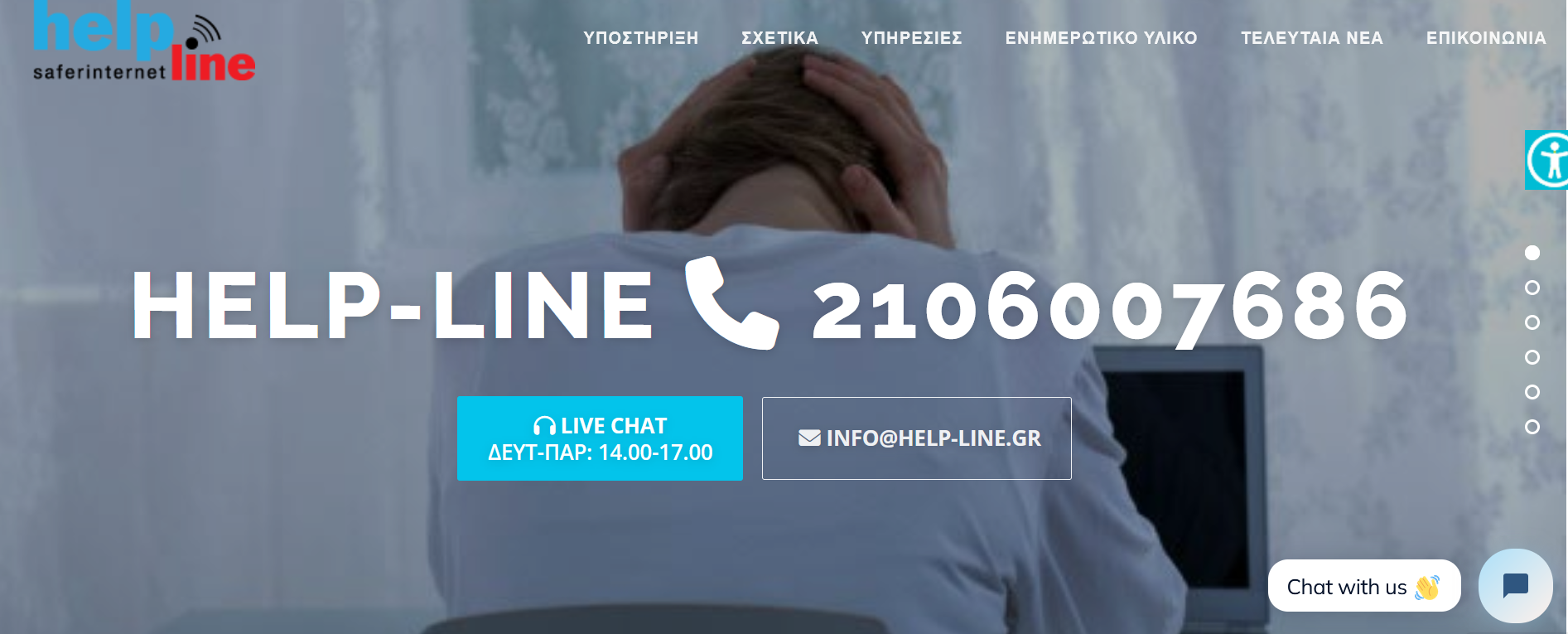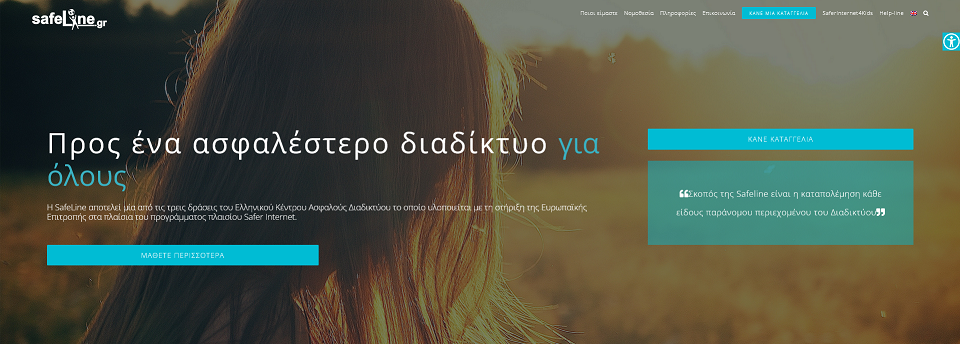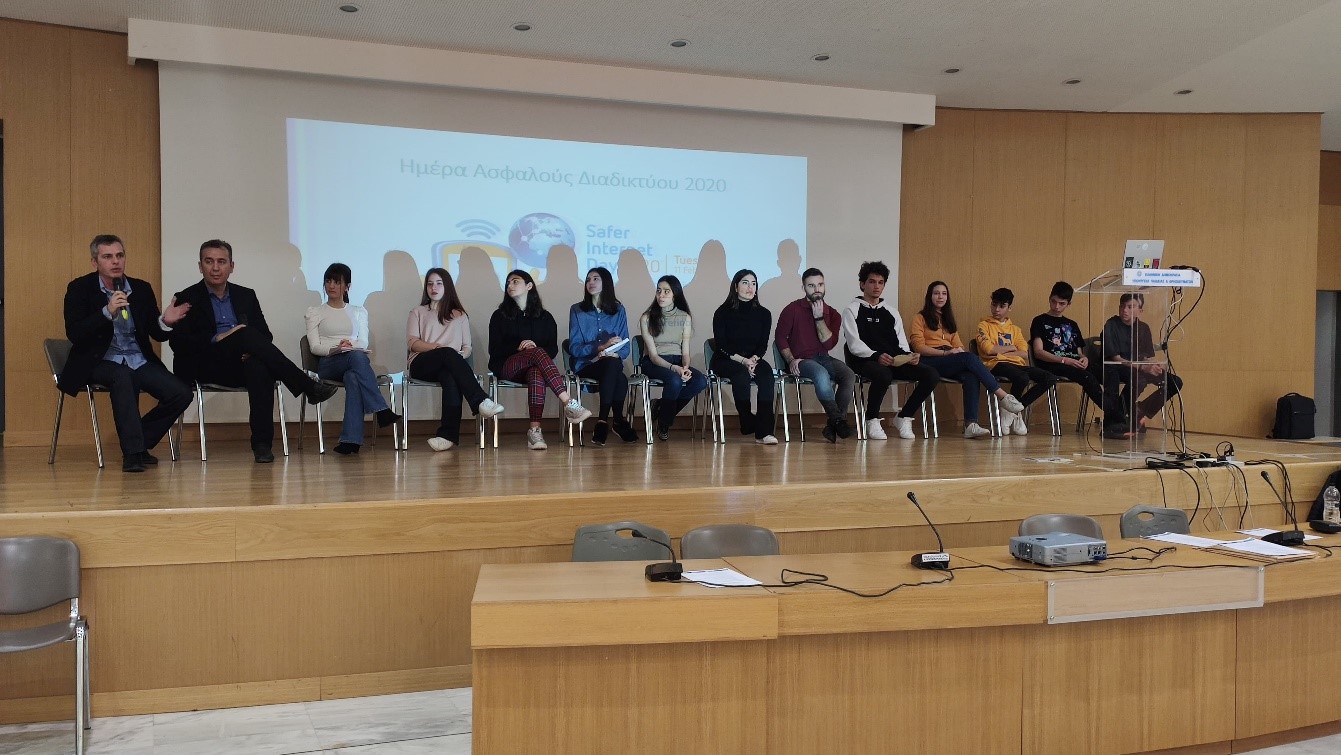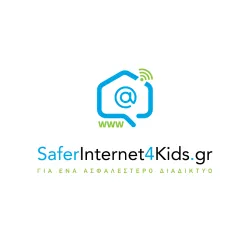About the organisation
The Greek Safer Internet Centre (SIC) has the ultimate goal of promoting safer, responsible, and better use of the internet and mobile technologies among children and young people, interacting with all stakeholders to bridge the digital divide between home and school, and between generations. It was launched in July 2016 under the auspices of the Foundation for Research and Technology - Hellas and, in particular, the Institute of Computer Science. FORTH is one of the largest research centres in Greece with well-organised facilities, highly qualified personnel, a reputation as a top-level research institution worldwide, and a great impact on Greek society.
Awareness centre
Saferinternet4kids.gr aims to create public awareness and provide reliable information to minors and their parents about the proper and safe use of online technologies. The awareness centre also provides supportive material to educators and social workers, in order for them to become multipliers of awareness messages within the classroom and beyond.
Contact and opening hours
The Αwareness Centre offers services during regular business hours and weekdays, and can be reached via email at contact@saferinternet4kids.gr. It is continuously accessible online through its main portal.
Helpline
The Helpline of the Greek Safer Internet Centre (SIC), 210 6007686, operates on working days from 9:00 to 17:00. It offers support via telephone, email, and chat in cases of harmful content and conduct, such as excessive internet use, bullying, or exposure to inappropriate online content. It primarily addresses minors, parents, and educators, but can also be consulted by the general public, industry, government, and public services.
Contact and opening hours
The Helpline services are available during regular working hours and days via telephone at 210 6007686 and by email contact@helpline.gr.
From 13:00 to 15:30 live chat support is available, after which the chatbot is activated on a 24/7 basis.

Hotline
SafeLine.gr is the hotline for reporting illegal content and conduct on the internet. SafeLine's primary concern is the elimination of child sexual abuse material (CSAM) from the internet and the fight against illegal content in general. SafeLine collaborates with internet service providers (ISPs), the Greek Research and Technology Network, the Greek School Network, and the Greek police in order to restrict the flow of illegal online content and have it removed.
Contact and opening hours
The Hotline is available 24/7, through it online form, the public complaint communications channel available at complaints@safeline.gr and via the emails report@safeline.gr and contact@safeline.gr.

Youth participation
The Greek Youth Panel is an important initiative for involving young people in the effort to promote safer and more responsible use of the internet. It is composed of 20 members from different educational levels, including elementary school, gymnasium and lyceum.
The members of the Youth Panel participate in events organised at a pan-European level, which provide them with a broader perspective on the issue of internet safety and enable them to exchange ideas with young people from other countries. Also, they meet online every two months, setting out the policy they will follow in order to raise awareness among their peers.
More information can be found at https://saferinternet4kids.gr/category/youth-area/.
How can you get involved?
Children and young people can actively participate in the work of the Safer Internet Centre in several ways:
- By contributing to peer-to-peer informative events
- Through the Panhellenic Student Competition
- By joining the Youth Panel
- By engaging in various consultations and initiatives led by the Centre.
Each child and young person can get involved by either reaching out to a school community ambassador (educator) or by sending an email to contact@saferinternet4kids.gr.

Key successes
The Greek Safer Internet Centre (SIC) engages in a series of actions to raise awareness and provide information about internet safety for children, young people, parents, and educators. Its main achievements can be summarized for the last two years as follows:
• 677K users and 2.4M pageviews on SaferInternet4Kids.gr.
• 40,000 followers on Facebook and 14,000 followers on Twitter. Presence on Instagram, TikTok and LinkedIn.
• 17,000 students, 4,000 educators and 3,000 parents are being educated almost every year.
• Comprehensive surveys targeting students, educators and parents to gain a deeper understanding.
• The realization of Panhellenic student competitions with great reach on a yearly basis.
• Joint effort with Ministry of Education and UNISEF to empower and support migrant and refugee children on internet safety. Various informative and educational materials have been translated into the three predominant languages among migrant children: Arabic, Farsi, and French.

Key partners/supporters
Key supporters
The Greek Safer Internet Centre (SIC) has several key supporters working together to promote a safer and
more responsible use of the internet in the country. Some of the key supporters of the Greek Safer Internet
Centre are the following:
- Ministry of Education and Religious Affairs
- Ministry of Digital Governance
- ENISA
- Greek Police (Cybercrime Unit)
- Industry partners such as Google, Facebook, Instagram, Viber, Twitter
- Panhellenic School Network
- Hellenic data protection Authority
Advisory members
The Greek SIC brings all relevant stakeholders together into a single united body, the Advisory Board of the
Centre, that meets up once a year, while engaging jointly in a variety of other activities throughout the year.
The Advisory Board acts as an open communication channel transferring to key national organizations news
from the EC and the European networks, and injecting best practices and the highlights of the European
scenery related to a safer internet. Complementary, the Advisory Board acts as an information exchange
body, promoting dialogue and helping carry the message of safer internet through all major stakeholders in
Greece.
The Advisory Board of the Greek SIC is composed of representatives from the following organizations:
- Members of the European Parliament
- Ministry of Education and Religious Affairs
- Ministry of Digital Governance
- Ministry of Justice
- Ministry of Transport and Communications
- Hellenic Cyber Crime Division
- Forensics Department of the Greek Police
- Region of Attica
- Municipality of Athens
- The Hellenic Data Protection Authority
- Central Union of Municipalities of Greece and the Hellenic Healthy Cities Network
- The Panhellenic School Network
- The Greek Ombudsman, Responsible for Child Safety
- Hellenic League for Human Rights
- Hellenic Authority for Communication Security and Privacy
- Hellenic Copyright Organization
- Supreme Confederation of Parents and Guardians of Greece
- Stavros Niarchos Foundation Cultural Center
- ENISA, the European Union Agency for Cybersecurity
- Google-Hellas
- OTE Group
- Wind
- Vodafone
- Nova
- UNICEF
- Omprela
- Network for Children's Rights
- SOS Children’s Villages Greece
- National Kapodistrian University of Athens, School of Law
- Aristotle University of Thessaloniki, School of Law
- University of the Aegean
- National Kapodistrian University of Athens, Psychology Department
- National Center for Science Research “Demokritos”
About the organisation
The Greek Safer Internet Centre (SIC) has the ultimate goal of promoting safer, responsible, and better use of the internet and mobile technologies among children and young people, interacting with all stakeholders to bridge the digital divide between home and school, and between generations. It was launched in July 2016 under the auspices of the Foundation for Research and Technology - Hellas and, in particular, the Institute of Computer Science. FORTH is one of the largest research centres in Greece with well-organised facilities, highly qualified personnel, a reputation as a top-level research institution worldwide, and a great impact on Greek society.
Awareness centre
Saferinternet4kids.gr aims to create public awareness and provide reliable information to minors and their parents about the proper and safe use of online technologies. The awareness centre also provides supportive material to educators and social workers, in order for them to become multipliers of awareness messages within the classroom and beyond.
Contact and opening hours
The Αwareness Centre offers services during regular business hours and weekdays, and can be reached via email at contact@saferinternet4kids.gr. It is continuously accessible online through its main portal.
Helpline
The Helpline of the Greek Safer Internet Centre (SIC), 210 6007686, operates on working days from 9:00 to 17:00. It offers support via telephone, email, and chat in cases of harmful content and conduct, such as excessive internet use, bullying, or exposure to inappropriate online content. It primarily addresses minors, parents, and educators, but can also be consulted by the general public, industry, government, and public services.
Contact and opening hours
The Helpline services are available during regular working hours and days via telephone at 210 6007686 and by email contact@helpline.gr.
From 13:00 to 15:30 live chat support is available, after which the chatbot is activated on a 24/7 basis.

Hotline
SafeLine.gr is the hotline for reporting illegal content and conduct on the internet. SafeLine's primary concern is the elimination of child sexual abuse material (CSAM) from the internet and the fight against illegal content in general. SafeLine collaborates with internet service providers (ISPs), the Greek Research and Technology Network, the Greek School Network, and the Greek police in order to restrict the flow of illegal online content and have it removed.
Contact and opening hours
The Hotline is available 24/7, through it online form, the public complaint communications channel available at complaints@safeline.gr and via the emails report@safeline.gr and contact@safeline.gr.

Youth participation
The Greek Youth Panel is an important initiative for involving young people in the effort to promote safer and more responsible use of the internet. It is composed of 20 members from different educational levels, including elementary school, gymnasium and lyceum.
The members of the Youth Panel participate in events organised at a pan-European level, which provide them with a broader perspective on the issue of internet safety and enable them to exchange ideas with young people from other countries. Also, they meet online every two months, setting out the policy they will follow in order to raise awareness among their peers.
More information can be found at https://saferinternet4kids.gr/category/youth-area/.
How can you get involved?
Children and young people can actively participate in the work of the Safer Internet Centre in several ways:
- By contributing to peer-to-peer informative events
- Through the Panhellenic Student Competition
- By joining the Youth Panel
- By engaging in various consultations and initiatives led by the Centre.
Each child and young person can get involved by either reaching out to a school community ambassador (educator) or by sending an email to contact@saferinternet4kids.gr.

Key successes
The Greek Safer Internet Centre (SIC) engages in a series of actions to raise awareness and provide information about internet safety for children, young people, parents, and educators. Its main achievements can be summarized for the last two years as follows:
• 677K users and 2.4M pageviews on SaferInternet4Kids.gr.
• 40,000 followers on Facebook and 14,000 followers on Twitter. Presence on Instagram, TikTok and LinkedIn.
• 17,000 students, 4,000 educators and 3,000 parents are being educated almost every year.
• Comprehensive surveys targeting students, educators and parents to gain a deeper understanding.
• The realization of Panhellenic student competitions with great reach on a yearly basis.
• Joint effort with Ministry of Education and UNISEF to empower and support migrant and refugee children on internet safety. Various informative and educational materials have been translated into the three predominant languages among migrant children: Arabic, Farsi, and French.

Key partners/supporters
Key supporters
The Greek Safer Internet Centre (SIC) has several key supporters working together to promote a safer and
more responsible use of the internet in the country. Some of the key supporters of the Greek Safer Internet
Centre are the following:
- Ministry of Education and Religious Affairs
- Ministry of Digital Governance
- ENISA
- Greek Police (Cybercrime Unit)
- Industry partners such as Google, Facebook, Instagram, Viber, Twitter
- Panhellenic School Network
- Hellenic data protection Authority
Advisory members
The Greek SIC brings all relevant stakeholders together into a single united body, the Advisory Board of the
Centre, that meets up once a year, while engaging jointly in a variety of other activities throughout the year.
The Advisory Board acts as an open communication channel transferring to key national organizations news
from the EC and the European networks, and injecting best practices and the highlights of the European
scenery related to a safer internet. Complementary, the Advisory Board acts as an information exchange
body, promoting dialogue and helping carry the message of safer internet through all major stakeholders in
Greece.
The Advisory Board of the Greek SIC is composed of representatives from the following organizations:
- Members of the European Parliament
- Ministry of Education and Religious Affairs
- Ministry of Digital Governance
- Ministry of Justice
- Ministry of Transport and Communications
- Hellenic Cyber Crime Division
- Forensics Department of the Greek Police
- Region of Attica
- Municipality of Athens
- The Hellenic Data Protection Authority
- Central Union of Municipalities of Greece and the Hellenic Healthy Cities Network
- The Panhellenic School Network
- The Greek Ombudsman, Responsible for Child Safety
- Hellenic League for Human Rights
- Hellenic Authority for Communication Security and Privacy
- Hellenic Copyright Organization
- Supreme Confederation of Parents and Guardians of Greece
- Stavros Niarchos Foundation Cultural Center
- ENISA, the European Union Agency for Cybersecurity
- Google-Hellas
- OTE Group
- Wind
- Vodafone
- Nova
- UNICEF
- Omprela
- Network for Children's Rights
- SOS Children’s Villages Greece
- National Kapodistrian University of Athens, School of Law
- Aristotle University of Thessaloniki, School of Law
- University of the Aegean
- National Kapodistrian University of Athens, Psychology Department
- National Center for Science Research “Demokritos”







